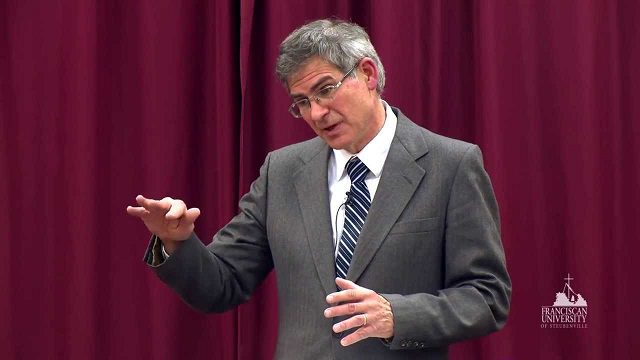
Dr. Christian Brugger is Senior Fellow of Ethics at the Culture of Life Foundation in Washington D.C. He replied to an article by Dr. Robert Fastiggi and Dr. Dawn Eden Goldstein, as noted in a LifeSiteNews article. Dr. Fastiggi then replied further in the combox and interacted with a “David” there. David’s words will be in blue.
***
Fastiggi’s and Eden’s claim on 303 seems to have gone nowhere, and indeed really does not change the meaning of the text. This is perhaps why they have quickly moved on to another angle to try and discount the “correctio” and any critics, by claiming these folks are not following proper “protocol.” That too is failing quickly, receiving refutation from other voices now, such as canonist Ed Peters, and I don’t think they will be able to dismiss him as some sort of hyper-critical, “anti-Francis” type. As others have pointed out such folks seems to engage in papal positivism, exalting the will of a pope no matter what he says or does, in any form or context said, even if contrary to the Church’s Tradition; in which case they are not interested so much in the truth but in a cult of personality. Indeed, as no less than Cardinal Mueller has confirmed, there is a tremendous emphasis on power, cult of personality, personal allegiance under this pontificate, to the expense of truth. It is certainly not the Catholic tradition that no one can ever criticize or question anything a Pope says, especially when it is so obvious there is a serious problem.
Prof. Brugger is a good theologian and a fine man, but he still seems to believe that AL 303 implies that God is asking people to continue to sin in some cases. In his April 22, 2016 article in Catholic World Report, Brugger writes that AL 303 suggests that “God can be ‘asking’ someone to live in a life-state in which they are objectively violating grave matter.” Then in a Sept. 28 ‘17 LifeSiteNews article, he states that “the generous response” owed to God is “a certain state that is objectively at variance with the universal command of the Gospel.” Now Prof. Brugger argues that, because the subject remains “this conscience” in AL 303, this proves that the “generous offering owed to God” is the recognition that one is living “contrary to “the universal command of the Gospel.”
Prof. Brugger fails to see that AL 303 clearly distinguishes between a conscience’s recognition that “a given situation is objectively at variance with the general mandate of the Gospel” and this same conscience’s subsequent recognition of a “generous response owed to God in the present circumstances.” The subject “conscience” might be the same but the object is different. The “generous response” is not the situation that is at variance with the command of the Gospel but an offering that God is asking amid the mass of impediments even though it may not yet be the perfect objective model.
What might be this “generous response?” Pope Francis does not give an example in AL 303 because he’s speaking in general terms of the dynamics of conscience. Moreover, he knows that concrete cases vary widely. In our Sept. 26 article in La Stampa, Dr. Goldstein and I provided a hypothetical example of a couple in a purely civil “marriage” recognizing that God is calling them to live in continence. We chose this example deliberately to demonstrate that “the generous response” could be the ending of a particular sin. Our example was an attempt to show that Professors Brugger and Seifert are wrong to believe AL 303 implies that God is asking some people to continue to live in an objectively sinful state. It’s really just the opposite. AL 303 teaches that conscience will come to recognize that God is asking for a step in the right direction away from sin. Pope Francis explains this again in AL 305 when he says “a small step, in the midst of great human limitations, can be more pleasing to God than a life which appears outwardly in order, but moves through the day without confronting great difficulties.’”
In a recent interview the Italian philosopher, Rocco Buttiglione, provides this example for AL 303: “Imagine a father who has a sick son and the child improves. He still has fever but has stopped vomiting; the child manages to keep in his stomach what he eats and has started a therapy that seems to work. The father is happy. Is he happy about the fact that the child is sick? No, he is pleased that his son gives symptoms of improvement and healing.”
This is what Pope Francis is saying in AL 303. God is not happy with situations that are objectively at variance with the command of the Gospel. God, however, is happy when people in such situations discern in conscience that He is asking them to make a choice that moves in the right direction—even if they still need to progress further toward a more complete fulfillment of His will. This is the law of gradualness not the gradualness of the law. It is sad that this beautiful and compassionate message of AL 303 has been so completely misunderstood by scholars who have failed to grasp its true meaning.
It seems you yourself are not sure this is the only meaning- that the generous response “could” or “might” be- not must be- continence. So, one could continue living in objective sin and offer some other “generous response?” And, Buttiglione openly argues that continence is not an absolute precondition; and therefore it may not constitute the offering made?! But he erroneously claims they can co-exist by confusing the subjective/objective issue, which he has done before and Ed Peters, among others, refutes. (Peters has a piece at Catholic World Report.) And compared with the absolute language of continence as a precondition in Familiaris Consortio et al., we have a clear change. So, even among those denying heterodoxy there are folks who admit no absolute requirement of continence, but try to explain how that can now be the case.
The whole problem is, in fact, that a call to continence is no longer being required in practice, which thus negates the meaning you impute anyway. Let us take the Maltese guidelines, which clearly indicate continence is not a requirement whatsoever and even state that communion cannot be denied to a couple still committing adultery. And it claims AL and Francis as its authority; and Francis has not only not disavowed this approach as inconsonant with his intent but given explicit public approval for these guidelines. The German guidelines also do not require continence as well as those of Rome; and arguably the Argentinian too but this might be debatable. And, people claiming to speak for Francis have also indicated this position, e.g, Archbishop Paglia, Cardinal Schonborn, who dishonestly claim that this notion was taught by JPII in some implicit way so therefore there is no rupture. (This is an unwitting admission something is wrong, for why even have to try to rationalize it by claiming it is part of a prior magisterium?) The Maltese guidelines also say that continence may actually be harmful, people are not necessarily capable of that (arguably a heresy, if not error, in itself), so adultery is essentially a solution. Semantics does not take away the underlying premise God is calling people to commit adultery, and how much they are imputable does not the disqualify that.
How do you account for all this? Are episcopal conferences and others all mistranslating AL, reading something into it that isn’t there, not grasping the true meaning? Why hasn’t Francis/Holy See then corrected this, etc, etc.? #303 is just the tip of the iceberg, of course. This, of course is the reason for the request for clarity, the Dubia, the Correctio. This is why the notion it is simply mistranslation/misinterpretation and critics are reading things into the text that are not there, cannot be sustained and is an untenable denial of an objective situation.
My comments were only focused on AL 303. I can’t speak for all these episcopal conferences that you mentioned. I believe Pope Francis has not changed the requirements of FC, 84 or the CCC, 1650. In AL 303 he was only speaking about the dynamics of conscience and how some people recognize that God is asking them to take a step in the right direction. We know that people are at different stages of conscience development. Pastors and friends need to help such people begin the process of living fully according to God’s plan, which, as Pope Francis teaches in AL 297, is “always possible by the power of the Holy Spirit.” If you wish to know my thoughts about whether the divorced and civilly remarried should receive Holy Communion without observing continence, google “Fastiggi Kasper” and you find out.
[“David” replied again: see it at the link provided above]
***
Photo credit: You Tube still of Dr. Robert Fastiggi, at a conference at the Franciscan University of Steubenville; video posted on 5-26-14 [link / Standard YouTube License]
***












